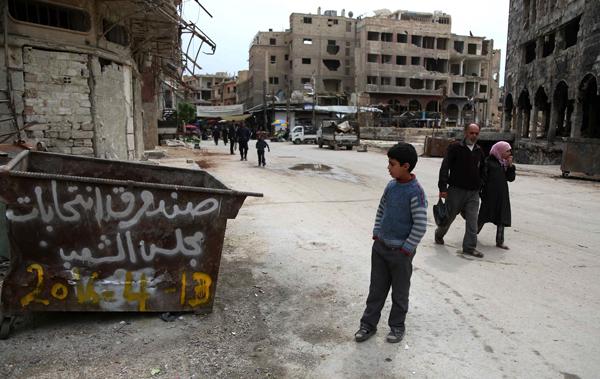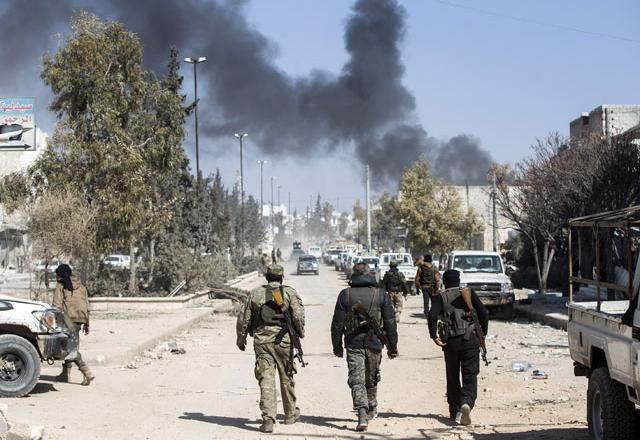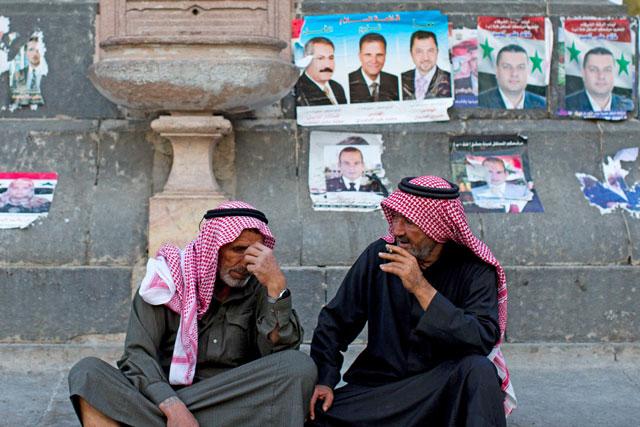You are here
Syria peace talks resume as violence surges
By AFP - Apr 13,2016 - Last updated at Apr 13,2016

A Syrian boy looks at anti-election graffiti describing the dust bin as ballot box for parliamentary elections in the rebel-held city of Douma on the eastern outskirts of the capital on Wednesday (AFP photo)
GENEVA — Talks to end Syria's brutal five-year conflict resumed in Geneva on Wednesday, but were clouded by a surge of violence threatening a fragile truce on the ground.
Adding to the tensions, Syrians began voting in government-controlled areas in a parliamentary election which is not recognised by the United Nations or by President Bashar Assad's main opponents.
The UN-brokered talks in Geneva are aimed at forming a transitional government and a new constitution followed by general elections to end a conflict that has killed more than 270,000 people and displaced half of the country's population.
But Assad's fate remains a major stumbling block.
UN Syria envoy Staffan de Mistura met with Assad's key allies Tehran and Moscow ahead of a meeting with the main opposition High Negotiations Committee (HNC) on Wednesday afternoon and regime representatives later in the week, probably Friday.
Russian Foreign Minister Sergei Lavrov stressed the importance of this round of talks, which is scheduled to last about 10 days.
"The Syrian parties should discuss the new constitution, and how they see the structure that will ensure a peaceful transition towards a new system," he told reporters in Moscow.
Transition away from Assad
A Western diplomat also said "there is more riding on this round" than previous rounds, since de Mistura is looking to tackle the thorny issue of "what does transition away from Assad actually look like".
Before the meeting with de Mistura, HNC advisor Yahya Aridi told AFP the opposition would "insist that there's one topic on its agenda: the political transition”.
The main question will be whether the regime delegation will agree to broach the issue of Assad's future, which it until now has insisted is off limits.
De Mistura is "walking in a bit of a minefield", Aridi acknowledged.
Complicating matters further, a surge in violence in recent days has threatened a landmark ceasefire agreed in February.
This has piled more pressure on the talks, which follow fruitless attempts in previous years to negotiate an end to the bloodshed.
"Right now, there are signs that this [the ceasefire] is slipping and it is a much more delicate environment for de Mistura to convene political talks," US Ambassador to the UN Samantha Power told reporters in New York after a briefing by the envoy on Tuesday.
Power said Moscow had to put pressure on Damascus to "get the regime back with the programme", adding she was "very alarmed" by Syria's plans to launch a Russian-backed counter-offensive in Aleppo, the epicentre of the renewed fighting.
Moscow began an air campaign in support of the regime last September, though last month it ordered the bulk of its forces to withdraw.
Wednesday's parliamentary elections in Syria, which caused the regime delegation to delay its arrival to Geneva, are also adding to the tension surrounding the negotiations.
The vote is taking place in areas under government control — around a third of Syrian territory where some 60 per cent of the population lives — and is expected to see Assad's Baath Party maintain control over parliament.
'A farce'
"They cannot buy back legitimacy by putting up a flimsy facade of democracy," a spokesman for the British government said on Wednesday.
The sentiment was echoed by some on the ground.
"These elections are a farce and I don't believe in them," said Mohammad Zobaidiyyeh, who works as a mechanic in Aleppo's eastern rebel-controlled neighbourhoods.
But others hailed the vote, with 37-year-old Yamin Al Homsi, a voter in Damascus, saying it would "decide the country's future".
Russia's foreign minister also defended the elections, saying their "role is to not leave a [power] vacuum”.
The partial truce brokered by Moscow and Washington, which took effect on February 27, had raised hopes for a resolution to the conflict, by bringing about a significant drop in civilian deaths and allowing increased aid deliveries.
But humanitarian access has recently slowed again to a crawl, and escalating fighting in northern Aleppo province, parts of Hama province and Damascus has sparked alarm.
Pro-government forces were on Tuesday pressing an advance against the town of Al Eis, held by Al Qaeda's local affiliate, Al Nusra Front, and allied rebels, the Syrian Observatory for Human Rights said.
Extremists like those from Al Nusra and Daesh are excluded from the ceasefire. But in some areas, Al Nusra is allied with rebel forces meant to be covered by the truce.
Washington voiced concern Monday that an assault on Al Nusra in Aleppo could spread to more moderate factions, and cause the truce to collapse and derail the peace efforts.
Related Articles
GENEVA — Russia has called on Syrian President Bashar Al Assad to stop his bombing campaign while peace talks take place this week, but a po
GENEVA — Syria's main opposition group met formally for the first time Monday with the UN special envoy, although it was unclear whether the
BEIRUT — Syria's landmark ceasefire was threatening to fall apart on Tuesday amid a surge of fresh fighting, especially in northern Aleppo p













